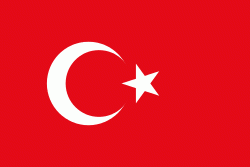Ünye
Ünye has a little port, in a bay on one of the flatter areas of the Black Sea coast. The climate is typical of the Black Sea region, warm and wet, although because the hinterland is flatter than most of the coastline Ünye has less rainfall. Agriculture is the basis of the local economy, in particular hazelnut growing, hazelnut trading and hazelnut processing. The town is very quiet in late-July and August when most people are in the countryside for the hazelnut harvest.
The town of Ünye provides high schools, higher education and other services to the surrounding countryside, and other industry includes a large cement factory, flour mills, local handicrafts and the port. The town has grown in recent decades, acquiring the multi-storey concrete blocks spreading along the coast, typical of so many Turkish towns. There are cafes and internet cafes popular with students. The cuisine includes the local pizza called pide.
With its quiet spots for picnics and walking and its excellent beaches Ünye is one of the nicest holiday towns on the eastern Black Sea coast. Affordable pensions and camping facilities as well as 2- or 3-star hotels can be found in the summer season. There are summer festivals and concerts in July.
Map - Ünye
Map
Country - Turkey
 |
|
| Flag of Turkey | |
One of the world's earliest permanently settled regions, present-day Turkey was home to important Neolithic sites like Göbekli Tepe, and was inhabited by ancient civilisations including the Hattians, Hittites, Anatolian peoples, Mycenaean Greeks, Persians and others. Following the conquests of Alexander the Great which started the Hellenistic period, most of the ancient regions in modern Turkey were culturally Hellenised, which continued during the Byzantine era. The Seljuk Turks began migrating in the 11th century, and the Sultanate of Rum ruled Anatolia until the Mongol invasion in 1243, when it disintegrated into small Turkish principalities. Beginning in the late 13th century, the Ottomans united the principalities and conquered the Balkans, and the Turkification of Anatolia increased during the Ottoman period. After Mehmed II conquered Constantinople (Istanbul) in 1453, Ottoman expansion continued under Selim I. During the reign of Suleiman the Magnificent, the Ottoman Empire became a global power. From the late 18th century onwards, the empire's power declined with a gradual loss of territories. Mahmud II started a period of modernisation in the early 19th century. The Young Turk Revolution of 1908 restricted the authority of the Sultan and restored the Ottoman Parliament after a 30-year suspension, ushering the empire into a multi-party period. The 1913 coup d'état put the country under the control of the Three Pashas, who facilitated the Empire's entry into World War I as part of the Central Powers in 1914. During the war, the Ottoman government committed genocides against its Armenian, Greek and Assyrian subjects. After its defeat in the war, the Ottoman Empire was partitioned.
Currency / Language
| ISO | Currency | Symbol | Significant figures |
|---|---|---|---|
| TRY | Turkish lira | ₺ | 2 |
| ISO | Language |
|---|---|
| AV | Avar language |
| AZ | Azerbaijani language |
| KU | Kurdish language |
| TR | Turkish language |















